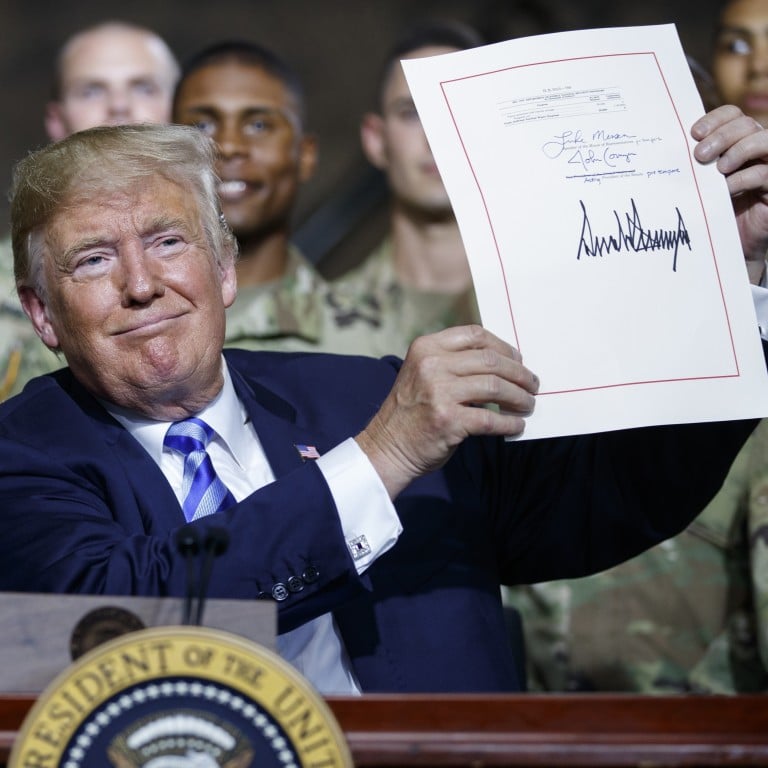
Wall Street finds silver lining even as trade war and US’ China security fears cause investment uncertainty: a growing demand for CFIUS consultancy
- Expansion of authority for the Committee for Foreign Investment in the United States has created demand for advisers to help steward deals
- ‘Like every deal has an antitrust approval, now CFIUS is right up there,’ one consultant said
Andrew Walker, a deal consultant at Accenture Strategy, usually spends his summers on the Outer Banks of North Carolina, where the beaches on the Atlantic Ocean help his family bond, and let him unwind.
This summer, though, the 47-year-old never made it to the beach – because of a stand off playing out between the US government and investors thousands of miles away, in China.
Like many Wall Street advisers, Walker, who leads Accenture’s Strategy’s cross-border acquisitions group, said that the consulting business for foreign investments is hot.
“I was holed up in the kitchen on the phone with lawyers the whole time trying to work out the national security issue for a deal, while my wife and kids are out on the beach,” he said. “Merger deals always have high-intensity periods around the deal close, but the new US government involvement has changed things significantly.”
To meet the demand, Accenture’s roster has grown to 50, from five people just three years ago, said Walker, who has been advising cross-border transactions for more than 15 years.
“And we are working long hours,” said Virginia-based Walker. “14 to 16 hours a day, plus weekends.”
With trade tensions between the US and China hurting foreign direct investment in recent years, Walker’s statement should sound exaggerated. The trade war has cast doubt over economic growth and job markets, cross-border deals volumes are down, and direct investment has been pulling back since 2018.
Yet Walker is one of many recruited into an effort to keep the already shrunken US$5.4 billion Chinese investment into the US from collapsing further amid trade-war suspicions and recriminations that seem to escalate on a daily basis.
Trump signs bill imposing tougher regulations on foreign investments
Accenture isn’t the only firm that has enjoyed an uptick in demand. These are boom times for a particular breed of adviser – those who help clients grapple with the beasts known as CFIUS issues.
“We used to have to explain that CFIUS was not a venereal disease. We don’t have to anymore,” said Ken Mendelson, president at Tumon Bay Consulting, a Washington-based CFIUS and national security deal consultancy.
National security has always been a US governmental concern in any merger deal involving foreign buyers. An inter-agency panel was established in 1975 by President Gerald Ford’s executive order: the Committee for Foreign Investment in the United States (CFIUS) was mandated to review any foreign purchase of US assets for national security threats.

CFIUS has been made central since 2017 when the Trump administration prioritised the possible dangers involved in foreign ownership in US technologies and data.
Last year, the CFIUS panel’s powers and review authority were expanded in the Foreign Investment Risk Review Modernization Act (FIRRMA): while specific countries were not named, the changes came amid Washington’s fears that Chinese companies buying American assets could jeopardise US technology leadership and pose national security threats.
US-China cross-border investments hit five-year low
On September 17, the Treasury Department, which heads the committee, proposed more than 300 pages of new CFIUS regulations, providing the details required by FIRRMA.
Those new regulations include transactions that involve non-controlling stakes. Sectors not previously considered CFIUS-related were added to the list, including acquisitions of real estate in proximity to US military or government facilities.
And for deals involving foreign government investors such as public pension funds, state-owned enterprises and sovereign wealth funds, the filings have been made mandatory.

“Two times this year, I had to tell my clients the deals they were proposing were impossible to go through because they wanted to bring the intellectual property back to their country,” John Lash, of the risk consultancy Control Risks in Washington, said. “We really need to understand the laws.”
These and other expansions make cross-border transactions harder to complete. The ones that succeed take longer, consultants said.
Thus, experts helping foreign investors clear these new hurdles are in high demand.
Other consultancies are experiencing a similar boom.
“We used to handle 10 to 15 CFIUS cases each year. In the past two years, we’ve seen the work at least double, ” Lash said, adding that his firm would be hiring in 2020.
“It’s going to be extremely difficult to find talent because there aren’t many consultants with a CFIUS background. What we are doing is establishing training protocol for people with geopolitical and merger experiences.”
Chicago advisory firm Grant Thornton said its consulting work in CFIUS has increased significantly in the last 18 months.
“We are training the talent we’ve got. You can’t go out to hire college graduates to do CFIUS work,” said Paul Melville at Grant Thornton, referring to the complexity of such work that requires deal experiences.
At law firms, the game of musical chairs has already begun. In Washington, leading global firms are engaged in bidding wars for each others’ talent.
In July, Vinson & Elkins hired Damara Chambers, a leading CFIUS lawyer from top-tier CFIUS shop Covington & Burling, to co-lead Vinson’s national security practice.
At least two Skadden Arps experts were recruited in recent months, with Joshua Gruenspecht joining Wilson Sonsini Goodrich & Rosati and Jonathan Gafni leaving for Linklaters. Others see a chance to go solo. Another Skadden lawyer, John Kabealo, set up his own shop, focusing on CFIUS and national security aspects of acquisitions.
The need for CFIUS advisers has also fundamentally changed the nature of consultants’ work. Unlike the traditional support work after deals close, consultants are increasingly involved in the strategic planning during, and sometimes before, deals take place.
The wave of demand started about two years ago when business owners saw high-profile deals torpedoed over CFIUS concerns.

Alibaba’s proposed US$1.2 billion acquisition of MoneyGram International in January 2018 was rejected because of fears that the data MoneyGram, a money transfer firm, holds about its clients could be used by the Chinese government to identify and blackmail US citizens. Alibaba owns the South China Morning Post.
Earlier this year, the US also raised CFIUS concerns about a Chinese company, Beijing Kunlun Tech, owning a stake in the gay-dating app Grindr – whose clients, the thinking went, might be subject to blackmail. Beijing Kunlun Tech is required to sell the stake by June 2020.
In a comparatively brief time, CFIUS reviews have risen to a status similar to the antitrust approval that every deal must win.
Treasury head defensive after reports Chinese investment in US tech will be blocked
The changes have alarmed not just buyers from China, the country of greatest concern to the US government, but also European deal makers. Calls are coming from European and US clients, consultants said – as well as from Chinese first-time investors in hi-tech industries.
Technology is now the most active sector by far for deals with CFIUS exposure. The planet’s increasingly interconnected digital networks make Washington extremely wary about the ownership of any next-generation communications infrastructure, for example, that could gain access to sensitive data.
But data outside tech are also considered at risk under the new law, if large stores of personal information are involved.
“Five years ago, transactions in defence and voting machines had CFIUS issues,” said Jeffrey Bialos, a CFIUS lawyer at Eversheds Sutherland. “Now they’ve expanded to sectors including hotel, insurance, data centres, insurance deals.”
The expanded CFIUS reach could have a further global impact. Governments such as Canada and Australia already have agencies overseeing foreign investments for national security concerns. Other governments – including those in China and India – are considering the enactment of similar laws.
“All the countries are looking at it. What we are going to see is if something like CFIUS will happen in multiple jurisdictions,” said Melville of Grant Thornton.
In that case, widening protectionism, among other things, could further dampen cross-border investments globally.
US investors ‘confidently’ pouring money into China despite trade war
“As we are moving slowly to hi-tech disengagement from China, Chinese deals in the US will continue to go down next year, partly because of the hostile relationship between the two countries,” Bialos said.
Lash, of Control Risks, was more upbeat.
“Based on what we are seeing, the number of cross-border deals will only increase. A lot of companies are excited but cautious.”
In 2020, he suggested, there would be double-digit percentile growth. Despite the greater number of hoops deal makers must now jump through, “more transactions will close because they will be more intelligently structured and mitigated”.
Most importantly, Lash added, “the US still is the foremost deal destination.
“None of that will change.”

